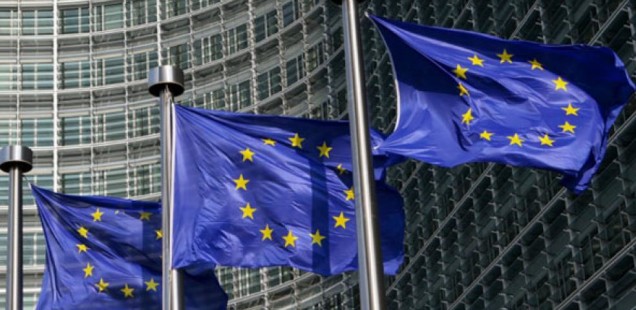
One Year Later, Europe’s Migrant Crisis Could Sink the EU
It’s now nearly a year since waves of migrants from the Middle East, North Africa, and South Asia began pounding European shores. Apart from the appalling human tragedies unfolding daily, it looks as if the greatest casualty of all may be Europe itself.
On Friday, 40-odd migrants, including 17 children, drowned off the Turkish coast as they headed for the Greek islands. If you barely noticed, you’re among many who have grown inured to such relentlessly grim reports from the Mediterranean.
Related: End of Europe? Berlin, Brussels’ Shock Tactic on Migrants
Each incident is sadder than the last for one simple reason: Europe has yet to come up with a coherent policy providing for (1) safe passage into the European Union, (2) orderly settlement of those who make it, and (3) measures to reduce the flow, if not eliminate it.
George Soros, the politically minded billionaire investor, brought the emerging reality home in an interview with a German business journal earlier this month. “The E.U. is on the verge of collapse,” Soros observed.
Soros had a lot on his mind—the aftereffects of the Greek crisis, the politics of austerity and its opponents, the threat of a British exit from the E.U., Ukraine and tensions with Russia—but it was the migration flow that produced his pithiest judgment. “We don’t have a European asylum policy,” he said. “It has transformed this past year’s growing influx of refugees from a manageable problem into an acute political crisis.” (The New York Review of Books just published an edited version of the interview.)
Related: European Economy Would Suffer If Free-Travel Zone Collapses
The core of the problem lies in the divergent interests of E.U. members. Some, notably but not only in eastern and southeastern Europe, are more concerned with saving national borders than with saving lives—to say nothing of the humanitarian principles that are supposed to bind European culture into one.
In consequence, E.U. leaders flail in their search for a solution at this point. The day of the latest tragedy at sea, the Financial Times reported from Brussels that they are privately considering “ring-fencing Greece” at its northern border to block the flow of migrants into Macedonia and onward into Western Europe.
This is desperation. It would trap tens of thousands of migrants—turning Greece into “a black box,” as Prime Minister Alexis Tsipras put it last weekend. Although Macedonia isn’t an E.U. member, the move would also deal a huge blow to the union’s open-borders principle as embodied in its Schengen policy.
The threats to Europe can now be divided into two, one among its ranks and the other on its eastern flank. The first is more formidable, but it’s a marginal call: They’re both huge and serious.
Related: Arrests, Security Fears Dampen New Year Spirit in Europe
A current of xenophobia and rightwing nationalism has gathered strength across Europe for many months. Its most notable manifestation came last September, when Hungarian Prime Minister Viktor Orbán presented a radical six-point plan to fortify Europe’s borders in defense of “Christian culture.”
Now comes a bigger threat. Following the sexual assaults in Cologne on New Year’s weekend, conservative MPs in Angela Merkel’s Christian Democratic Union are breaking into open revolt against the German chancellor’s courageously humanitarian policy on the migrant question.
Despite domestic resistance, more than a million migrants passed through Merkel’s open door last year. If she is forced to accede to the demands of CDU rebels—full border controls, almost all refugees barred—Schengen will be curtains and the E.U. will lose its wisest leader on the migrant crisis and probably its direction.
Europe’s other problem, ever more evident, is Turkey. It’s now plain that its effort to recruit the Ankara government as a lynchpin ally in stanching the flow of migrants into Europe has been completely ineffective.
Related: Fear and Few Answers as Turkish Police Round Up Syrian Refugees
This is the reality behind the nonsensical talk last week of fortifying Greece’s border with Macedonia. In effect, such a policy would move the front line in the migrant crisis from Turkey’s coast westward to Greece’s northern frontier.
It’s an admission of failure: Recip Tayyid Erdoğan, Turkey’s president, has proven more or less a deadbeat since the Europeans, in a pact signed last November, committed to giving Turkey $3.3 billion in refugee-related assistance.
After the injury comes the insult. Over the weekend, Turkish Premier
Ahmet Davutoğlu announced on arriving in Berlin for talks with Merkel that the Erdoğan government now insists on yet more money.
Related: No Drop in Asylum Seekers Reaching Germany, Berlin Says
“The €3 billion is just to show the political will to share the burden,” Davutoğlu said in an interview with DPA, the German press agency. “We will review it again and again… and we are not begging for money from the E.U. But if there is a serious will to share the burden, than we will have to sit and talk about all of the details of the crisis.”
One could call this a shakedown in broad daylight, but that’s not polite. Let’s just say (1) it isn’t an accurate account of what was agreed in November, (2) it is highly doubtful the E.U. spent €3 billion “just to show political will,” and (3) Merkel is possessed of an awesome patience.
As background here, there is formidable evidence that members of the Erdoğan government may be profiting from the Islamic State’s illicit oil trade. My sources in Europe and Turkey tell me there are indications Turkish officials may also be taking a cut from migrant traffickers.
These reports bear investigation. If there’s a question of “serious will” at issue, as Davutoğlu suggested, it’s more likely to lie with Turkey than the E.U.

